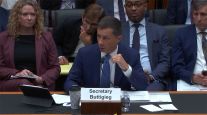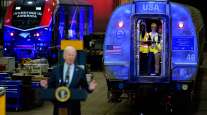Senior Reporter
Rep. Rodney Davis: Fund Infrastructure Account Like a 401(k)
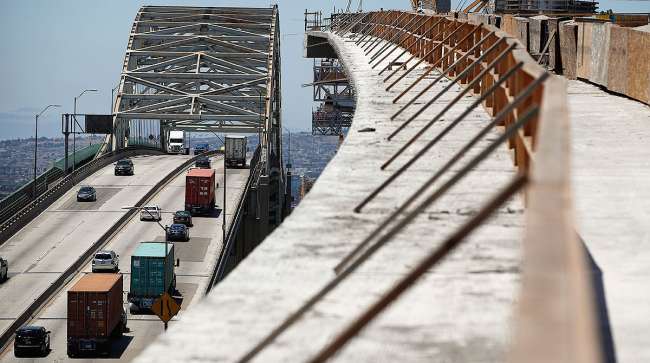
WASHINGTON — How do you keep infrastructure projects funded in this country is the multitrillion-dollar question policymakers on Capitol Hill have yet to answer.
It is the focal point of ongoing discussion since a federal account that assists states with infrastructure projects, maintenance and repairs is headed toward insolvency.
U.S. House Democratic leaders planning to unveil infrastructure legislation in about a month speak favorably of raising fuel taxes, revenue of which supports the Highway Trust Fund account.
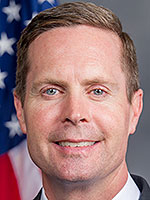
Davis
If it were up to Rep. Rodney Davis, the top Republican on the subcommittee that oversees highway policy, the current funding structure for infrastructure projects would be tweaked.
A three-term member of Congress from Illinois, Davis is among the small circle of policymakers helping stitch together a comprehensive package poised to become the talk of the town.
As he explained, the proposal would replace the Highway Trust Fund structure with something that would emulate conventional retirement accounts. Kind of like a 401(k). Doing so, he argued, could help achieve the long-term sustainable funding required to bring the transportation system to a state of good repair.
Meaning, that by dropping the current format of relying primarily on revenue from the federal fuel tax, policymakers instead could opt for a program anchored on two words: multiple options.
Davis explained the government incentivizes manufacturers and consumers who embrace cleaner vehicle engines. Therefore, creating a new portfolio consisting of funding options for freight and commuter networks would capture the vehicles on the roadways that consume little to no fuel. Improvements in fuel economy have contributed to the dwindling revenue generated from the Clinton-era 18.4 cents-per-gallon gas and 24.4 cents-per-gallon diesel tax.
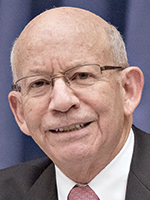
DeFazio
Despite belonging to the party out of power in the House, Davis expressed confidence that his Democratic counterparts would be receptive to his idea. He is very much aware the top transportation authorizer in the U.S. House, Rep. Peter DeFazio (D-Ore.), has signaled support for a fuel tax boost. And groups, such as the U.S. Chamber of Commerce, have called for a 25 cents-per-gallon fuel tax increase over five years. The chamber’s leadership pledged to support members of Congress who would back their proposal.
“I look forward to working with the chamber. I’m glad the chamber wants to go out and protect members who have voted for more infrastructure funding because they actually — they understand it affects their members. It affects the ability to get commerce from point ‘A’ to point ‘B,’ ” Davis told Transport Topics from Capitol Hill on April 2. “I certainly don’t think they’d be upset if we looked at a 401(k)-type of option that would include more stable sources of funding, less volatile sources of funding that would be less dependent upon marketplace pressures and then if one marketplace pressure rose above another, you would then have the elasticity within that 401(k) to keep the funding stable.”
The 401(k) concept is one Davis has been championing since GOP leaders tapped him to represent the party’s objectives on infrastructure policy in the 116th Congress. Whatever options make up his new system still are subject for debate, he said. An alternative to the fuel tax has been charging motorists a fee for miles traveled, known as VMT. The approach has the endorsement from the top Republican on the transportation panel, Missouri Rep. Sam Graves.
Davis did not rule out the VMT fee: “How do we bring everybody’s good idea into a 401(k)-type of portfolio so that — give everybody a victory and what it is they think is going to be the best funding of infrastructure spending.”
“Why in the world would we limit our debate when it’s so hard to do anyway, so hard to accomplish anyway when it comes to funding user fees and the political courage to increase those user fees. Why would we just limit it to the gas tax debate?” the congressman added. “If you just raise the gas tax, you’re still subject to that volatility in the marketplace. So why don’t we make a system of user fees and funding sources that will be less volatile to future technology?”
Besides funding, congressional transportation leaders have yet to announce whether an infrastructure bill would include the reauthorization of the 2015 highway law, called the FAST Act. The law expires in the fall of 2020.
Part of the palace intrigue with regard to infrastructure policy negotiations is whether Democrats will proceed with two bills: an infrastructure package and a highway reauthorization.
Davis is not impressed: “I’m sick and tired of everybody talking about infrastructure being an area of bipartisanship and then all of a sudden people want to start complaining: Can we do it together, or should we do it separate. Hey, let’s just do something. Let’s not take an option off the table.”
Another caveat with the debate is the partisan politics that could infect high-level discussions. Graves recently told state transportation leaders that Congress had until August to advance an infrastructure package. After that, questions about funding the federal government and the 2020 presidential contest would eclipse policy discussions. Leadership at the U.S. Chamber of Commerce, the association representing the road builders and other stakeholders agree August is the deadline for legislating on infrastructure in the 116th Congress.
For Davis, the measure has a realistic chance of passing.
“The key is, is the Democratic leadership going to be able to allow us to work with the administration and our colleagues in the Senate to move a bipartisan bill forward,” he said. “Or is it going to be too much pressure, too much pressure to deny the president a victory going into re-election.”


